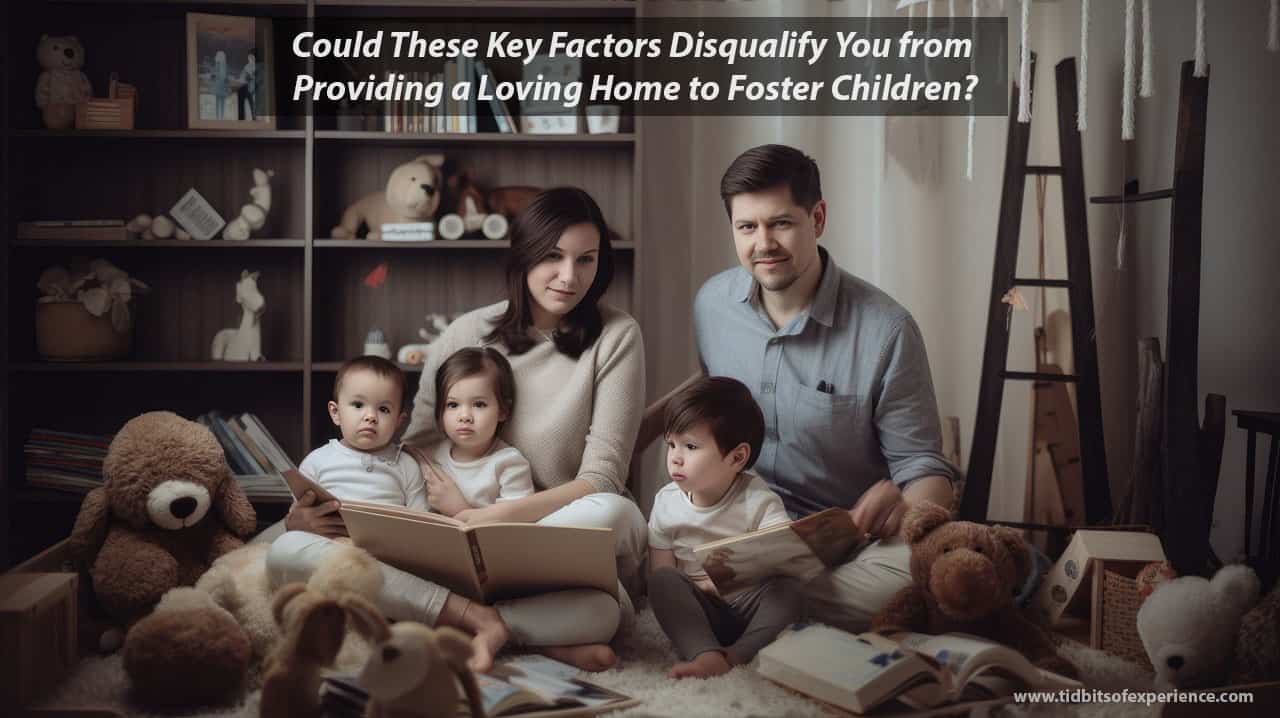Becoming a foster parent can be an incredibly rewarding experience, providing children in need with a caring and supportive home. However, it’s crucial to understand the requirements and restrictions involved before embarking on this journey.
In this blog post, we will explore what disqualifies one from becoming a foster parent by examining key factors like background checks, income levels, living conditions, and health status.
By being informed about these essential aspects of fostering eligibility, you’ll be better prepared to navigate the process successfully and make a positive difference in the lives of vulnerable children.
Key Takeaways
To become a foster parent, you must meet specific requirements, including passing background checks and having a stable income that can support yourself, your family, and the foster child. You must also provide an appropriate living environment for the child.
Certain factors may disqualify you from becoming a foster parent, such as criminal convictions or struggling with substance abuse problems. Having a history of child abuse would also make you ineligible to be a foster parent.
It’s crucial to understand that your past behavior can impact your ability to become a successful foster parent. However, agencies will take into consideration how applicants have grown from their struggles or mistakes when evaluating eligibility for fostering.
Transparency is essential during the application process: disclosing any information requested about past criminal records alongside personal adversities and growth in recovery related to alcohol or drug use are critical steps towards earning approval as suitable caregivers capable of providing secure and loving homes where children thrive physically, emotionally, mentally, and socially.
Table of Contents
Basic Requirements For Becoming A Foster Parent

To become a foster parent, it is essential to meet specific requirements that ensure a safe and nurturing environment for the child. These basic requirements include:
- Being at least 21 years old
- Having a stable income that is sufficient to support yourself, your family, and the foster child (as stated in Important Facts #3)
- Completing all required training sessions (as stated in Important Facts #2)
- Passing state and federal background checks, including criminal history and sex offender searches (as stated in Important Facts #1)
- Ensuring that all household members over 14 years old undergo criminal background checks and child abuse/neglect background checks (as stated in Important Facts #5)
- Maintaining good physical and mental health to provide adequate care for children, as verified by a health screening (as stated in Important Facts #6)
- Providing an appropriate living environment for the child, including a safe home with enough space for each foster child
- Possessing a valid driver’s license and reliable transportation
- Demonstrating a willingness to work with the Child Placing Agency (CPA) or Department of Human Services on an ongoing basis
- Ensuring that you can cope with stress effectively, as raising foster children can be challenging
- Agreeing to participate in regular social assessments and home inspections conducted by the CPA
Factors That May Disqualify You From Being A Foster Parent

Certain factors may disqualify you from becoming a foster parent, including having a criminal record, struggling with alcohol or drug problems, and having a history of child abuse.
Criminal Record
One of the critical factors that may disqualify you from becoming a foster parent is having a criminal record. This is because the safety and well-being of children in foster care are paramount, and prospective foster parents must undergo thorough background checks to ensure they can provide a secure environment for vulnerable kids.
Having any criminal convictions that could potentially put children at risk will result in your ineligibility to become a foster parent. For instance, barrier crimes such as violent offenses, sex-related crimes, or felony drug convictions can lead to automatic disqualification from fostering.
Honesty and transparency are crucial during this stage; any attempt to withhold information about past criminal records could negatively affect your application – even if it does not involve one of those barrier crimes mentioned earlier.
Alcohol Or Drug Problems
The presence of alcohol or drug problems can be a major hindrance for individuals looking to become foster parents. FosterVA and other Child Placing Agencies (CPA) aim to ensure the safety and well-being of children in their care, so it is crucial that prospective caregivers demonstrate responsibility and maintain a healthy lifestyle free from substance abuse. If you have faced legal issues related to substance abuse, such as consulting an Arizona possession of narcotic drugs lawyer, it may also be taken into account during the evaluation process.
During the fostering application process, background checks are carried out to assess potential risk factors such as substance abuse. It’s important to note that even if you’ve overcome an addiction, your past struggles could still present concerns for agencies evaluating your suitability as a foster parent.
In addition to background checks, applicants undergo interviews where they have the opportunity to discuss any personal adversities they’ve faced — including overcoming alcohol or drug problems — and provide evidence demonstrating how they’ve addressed these hurdles.
For instance, this could include highlighting the successful completion of rehabilitation programs or showcasing ongoing involvement in support groups like Alcoholics Anonymous or Narcotics Anonymous.
History Of Child Abuse
Having a history of child abuse can disqualify you from being a foster parent. This includes physical, emotional, and sexual abuse. When applying to become a foster parent, you will need to disclose any reports of child abuse and neglect that were made against you, even if they were unfounded.
It’s important to keep in mind that the primary goal of foster care services is to provide children with safe homes and loving families. Therefore, those who have a history of child abuse may not be eligible to become foster parents due to concerns about their past behavior potentially harming vulnerable children in their care.
Insufficient Income
One of the basic requirements for becoming a foster parent is having sufficient income to provide for both your family and the foster child. The Department of Human Services in Virginia requires that prospective parents have an adequate financial capacity that goes above and beyond monthly reimbursements provided by the agency.
This means you must be able to afford food, clothing, medical expenses, transportation, and other necessities without relying entirely on government funds. Insufficient income is one of the disqualifying factors for fostering because it can negatively impact a child’s emotional security and physical well-being if they are living in an environment with inadequate resources or finances.
Medically Unfit
To become a foster parent, it is important to be in good health both physically and mentally. Any medical conditions that could interfere with providing proper care for children may disqualify an applicant from being a foster parent.
For instance, if the potential caregiver has a condition that requires frequent hospitalization or medication management, this could hamper their ability to provide stable care or attend appointments on time.
Additionally, certain illnesses could pose a risk to other vulnerable children in the home.
It’s essential for parents interested in fostering or adopting to ensure they have no underlying health issues that would affect their capacity to provide emotional security and physical stability for growing kids.
Unsuitable Living Environment
The living environment of a foster child is of paramount importance, and it must be safe and adequate to meet their needs. A lack of suitable space, hygienic conditions, or access to basic amenities may disqualify an applicant from becoming a foster parent.
The home should have enough space for the additional children in care, with separate sleeping arrangements for each child. Additionally, pets should not pose any danger to the welfare of the children.
An unsuitable living environment can lead to negative consequences such as physical harm or neglectful behavior toward children placed in their care. Applicants interested in fostering must ensure they review these factors appropriately before applying.
This includes ensuring there is no domestic violence or conflict within the household, which could affect its suitability as a temporary home for a foster child.
Factors That Automatically Disqualify You From Being A Foster Parent

Certain criminal convictions, inability to cope with stress, and lack of required documentation are some factors that may automatically disqualify you from becoming a foster parent.
Certain Criminal Convictions
It’s essential to note that having certain criminal convictions can automatically disqualify you from becoming a foster parent. Here are some of these convictions:
- Any sex crimes, including rape or sexual assault
- Child abuse or neglect
- Domestic violence against a spouse or child
- Any offense involving the use or sale of illegal drugs
- Murder, manslaughter, or any other violent crime
As a potential foster parent, it’s crucial to understand that your past criminal history may impact your ability to provide care for vulnerable children. It’s always best, to be honest about your background and let the agency make an informed decision based on all available information. Remember that, ultimately, the goal is to ensure that children in foster care receive the love and support they need to thrive in a safe environment.
Inability To Cope With Stress
Coping with stress is a crucial skill that all foster parents must possess. The process of fostering a child can be emotionally challenging for both the parent and the child, and it requires significant patience, resilience, and emotional stability to provide adequate care.
The inability to cope with stress is one of the leading factors that may disqualify you from becoming a foster parent.
Prospective foster parents are screened for their capacity to handle stressful situations during training sessions and interviews. The Child Placing Agency (CPA) will evaluate your ability to remain calm under pressure, manage conflicts peacefully, and respond appropriately to difficult behaviors from children in your care.
Lack Of Required Documentation
As a potential foster parent, you must provide the necessary documentation to prove your identity and qualifications. Failure to submit these documents could disqualify you from becoming a foster parent.
Some of the required documentation includes background checks, financial statements, and medical records of all household members.
It is important that you check with your Child Placing Agency (CPA) regarding the specific requirements for fostering in your state since different states may require varying degrees of documentation.
While it may seem daunting at first, ensuring that all your paperwork is complete and accurate can go a long way in demonstrating your commitment as a prospective foster parent.
Frequently Asked Questions About What Disqualifies You From being a Foster Parent
What are some common requirements to become a foster parent?
Some common requirements to become a foster parent include being at least 21 years old, passing a criminal background check, completing training and home study assessments, having enough space in your home for an additional child or children, and demonstrating financial stability.
What types of restrictions can disqualify someone from becoming a foster parent?
Restrictions that could disqualify someone from becoming a foster parent include having certain criminal convictions such as child abuse or neglect, struggling with substance abuse or addiction issues, lacking stable housing or income, displaying inappropriate behavior during the assessment process, or not meeting state-mandated licensing requirements.
How long does it typically take to become licensed as a foster parent?
The time it takes to become licensed as a foster parent can vary depending on several factors, including location and individual circumstances. In general, licensing may take anywhere from several months up to a year while going through the screening process, which includes orientation sessions, training courses, and evaluations.
Can non-traditional families apply to be foster parents?
Yes! Non-traditional families, including those who are single-parent LGBTQ+ couples, are eligible for fostering just like any other family structure — so long as they meet all eligibility criteria set by their local Child Protective Services agency and demonstrate proficiency in providing stable homes for children placed under their care.
Conclusion
Becoming a foster parent is a noble and rewarding experience that can change both your life and the lives of children in need. However, it’s important to understand the basic requirements, restrictions, and key factors that may disqualify you from becoming one.
A criminal record or convictions of certain crimes are automatic disqualifiers. Your household must be free from illegal drug use or alcohol abuse while fully disclosing prior incidents of child abuse means honestly being transparent about yourself as an applicant.
Additionally, there are numerous regulations governing income level, mental/physical health condition, and suitable living environment required for someone interested in fostering children in Virginia (VA).
